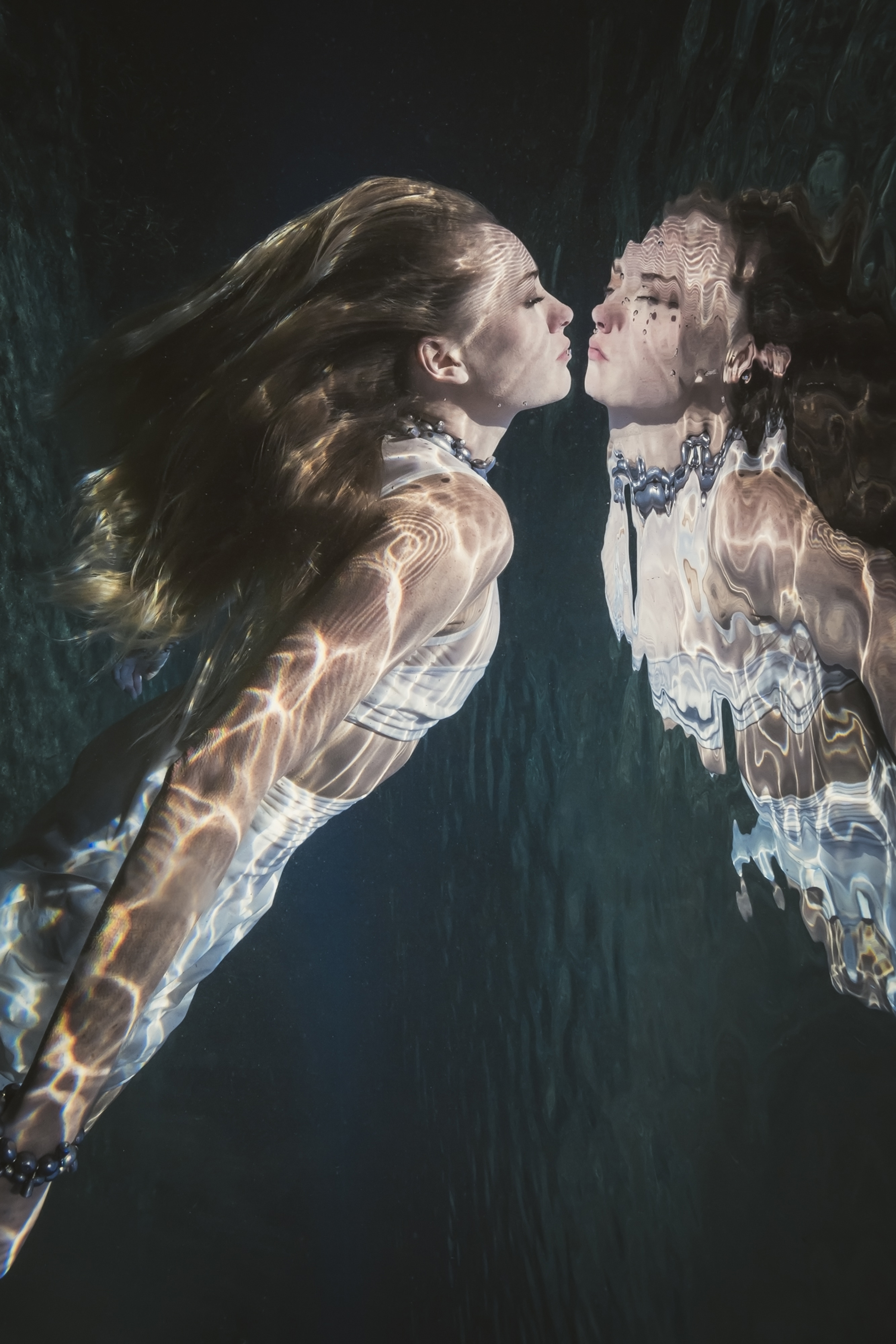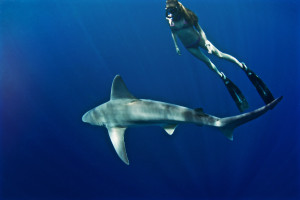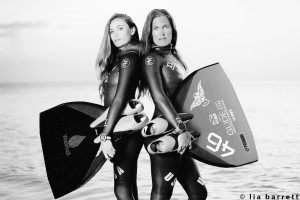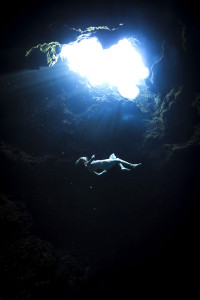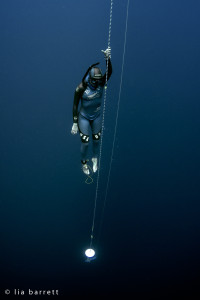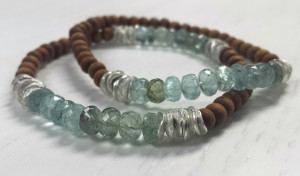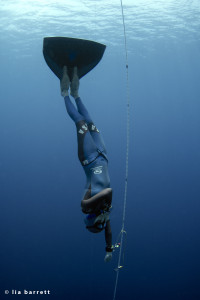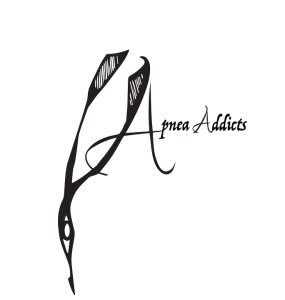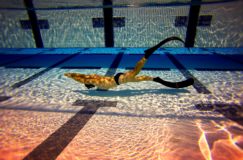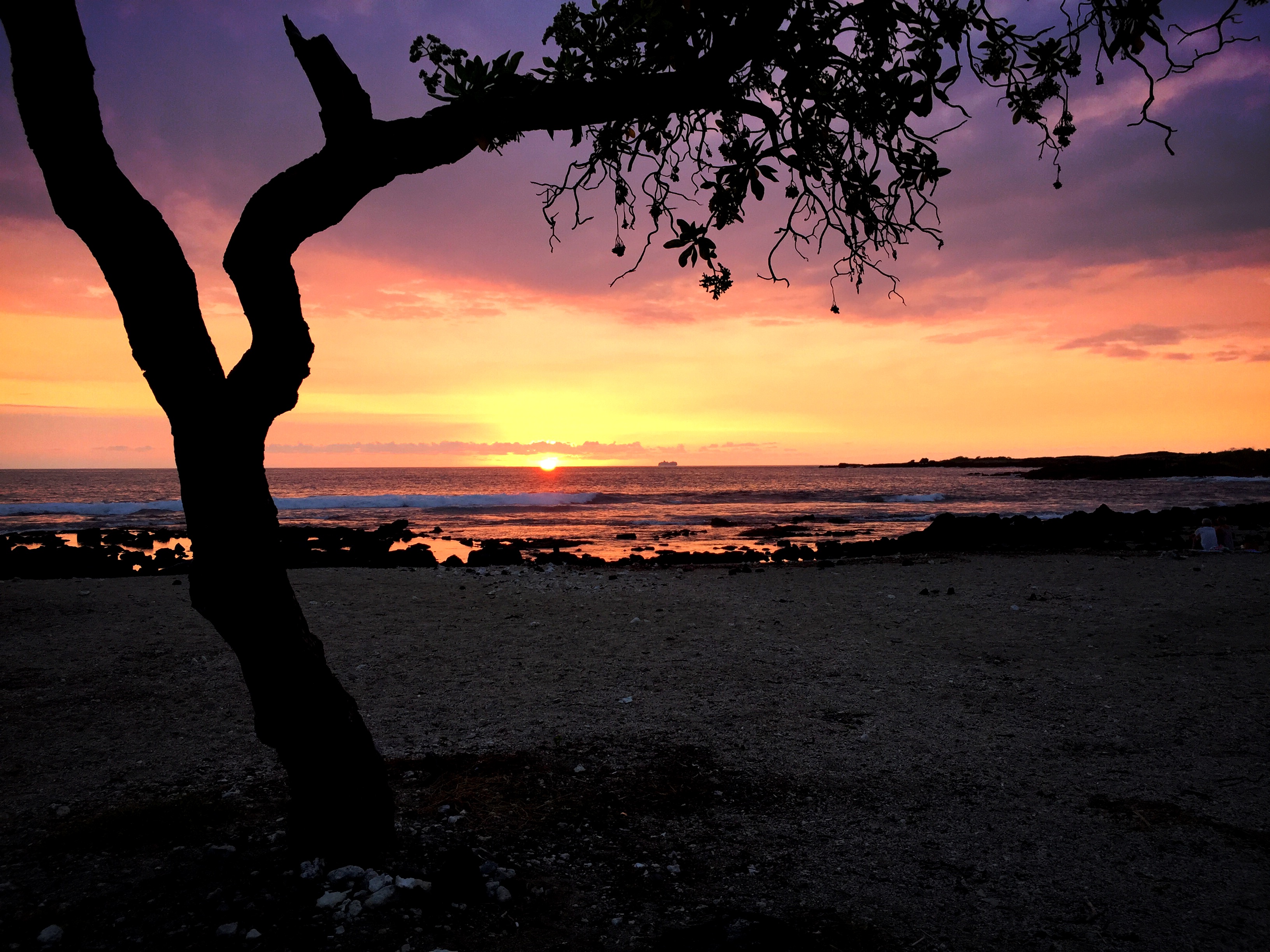Interview with Ashleigh Baird
Photo:Goh Iromoto
Running late to the interview from a class I was attending, I sprinted up to this little restaurant on the canal in Pompano beach to find it empty… except for a backlit silhouetted image of the woman I’d been reading about and emailing, sitting solo at the bar. I introduced myself, and I could see she’d been in the ocean. Salt crystals still hanging off her eyelashes, and her cheeks kissed by the sun, as she turned with a tired smile and a yawn to greet me.
AA: “You must be Ashleigh”
Baird: “hahah yeah, sorry… I’m tired. I’ve been shark diving all day”
(Best Introduction ever!)
AA: “WOW, amazing…. ok lets start with that!”
Baird: “I just had my first big shark experience! I went out with Florida Shark Divers and it was great. We saw 4 species and the last drift brought in 9-10 bull sharks. Things got more serious once those guys showed up, but it was amazing to see how they operate in packs. My favorite of the day were the Silkies. They were so relaxed and inquisitive, we were able to get very close and there was just no tension in the water at all. It was amazing…..”
Before we get more into the interview, and the set questions I brought along, let me start with a little about Ashleigh from our candid conversation. Her love affair with apnea began as a kid holding her breath in the back of the family car on long family road trips and zip tying her legs together in the pool to “practice her mermaid kick” (which she doesn’t recommend letting your kids do). Not really knowing anything about freediving as a kid, she would snorkel the Florida springs with her uncle, and had many other water adventures with her family. Her love for the water and the natural world inspired her pencil drawings in high school, and left her wanting to become a marine biologist… Life had a different plan for her. She ended up deciding on a degree in architecture, and her art went from sketches and paintings, to physical models and renderings – and more recently, to making beautiful handcrafted jewelry.
In 2009, it was a special on National geographic featuring Tanya Streeter that lead to her mass google search to “…find those long fins” and a life long obsession with learning how to freedive and improving her apnea skills. She took her first freediving class in Florida which only fueled her fire, and made her hop on a plane to Hawaii to take the next class. In May 2011 she did her first competition in Grand Cayman, and has been competing ever since. She is currently part of the US Women’s Freediving Team and her favorite disciplines are Static Apnea and Constant weight, but found a new love pushing herself with Constant weight/ no fins (the purest form of freediving).
The Interview:
AA: “Where did freediving begin for you? Earliest memory freediving? What hooked you?”
Baird: “It’s kind of hard to define it. My earliest memories are spread between swimming pools and diving in the springs. We were also lucky enough to have some great adventures sailing in the keys.”
AA: “What is it about freediving that you love?”
Baird: “I’d say it’s the silence and peace that it awakens inside of you. I can try to describe it, but it’s one thing to hear about it, and an entirely different thing to experience for yourself. It’s just pure bliss.”
AA: “What is it that you enjoy most about the ocean?”
Baird: “It’s wildness. Exploring the ocean feels a bit like you’ve been set free in a vast wilderness with no one else around.”
AA: “Growing up in Florida what’s more fun… freshwater cenotes or the ocean?”
Baird: “The springs for sure. There is something indescribably hypnotic about those places. It’s as though you’re swimming through a timeless landscape. In the caves the space is so tangible, it’s so different from anything I’ve ever experienced above water.”
AA: “Favorite pelagic encounter?”
Baird: “Hands down my favorite encounter was with humpbacks while filming with GoPro in Tonga. It was with a female humpback and her suitor in Tonga. They gave us an incredible show over a deep reef, I’ll never forget it.”See Baird dive with humpback whales
AA: “Do you spearfish? If yes, what’s your biggest catch? Favorite catch? Any fun fish stories or hunting tips?”
Baird: “Spearfishing just isn’t in my nature. I’ve had a go at it a few times, and my biggest catch was a grouper (I can’t remember how big it was). One tip I could give anyone who spearfishes is to hunt in a pack of 3 divers. You’re much more efficient that way. I know it sounds counter-intuitive – like it would slow you down – but it doesn’t. It keeps you fresh for your drops and increases safety. And the same goes for depth training. I highly recommend giving it a try.”
AA: “Do you get sea sick? Any awesome remedies you can lend to our audience? (ie combo of butterfly eyelash and rhinoceros tear. jk lol)
Baird: “I don’t usually get sea sick unless I’m really exhausted. I’ve heard candied ginger is a decent remedy, but there’s also an over the counter remedy called Stugeron. It’s like Dramamine but it doesn’t knock you out. Only downside is it’s not available here in the States, but you should be able to find it online.”
AA: “What did it take for you to qualify on the national team?”
Baird: “Applying! Seriously.. not many women apply so if you have good numbers and want to go, you can probably make it. And we definitely need more women stepping up and representing the US! Applicants just need to have their performances registered with AIDA, which is done by participating in a competition with AIDA judges (the organizer must also submit the results to AIDA). You can find a list of AIDA sanctioned competitions posted on the AIDA website.”
AA: “What are your personal bests? Any goals you’d like to share or things you’re targeting?
Baird: “The only PB’s worth mentioning would be a 66m CWT dive I did while training last year, and a 6 minute static I did a few years back. In terms of goals, it would be amazing to get my depth into the 5,000 meter range… but I’m pretty sure I have to get to the 70’s first 😉 I also really just want to get beyond my PB in static, even if it’s only by a few seconds.”
AA: “Sponsors for freediving are not like sponsors for most sports. You’re often on your own… aside from gear. What do you do to help fund your training and competition expenses?”
Baird: “I’ve been slowly creating a jewelry line since late last year, and decided to sell some of the pieces to help fund this year’s Caribbean Cup competition. I was really excited and surprised to see how many people were interested in the pieces. My goals right now are to focus solely on training and building my jewelry line for the next 6-8 months. Doing both is going to be a big undertaking and will require a lot of discipline, but I’m passionate about it and am dying to see whether the business will succeed or fail. It’s actually very exciting!”
AA: “Often times when we take what we love, and begin to compete or turn it into our job, we tend to work the “fun” out of it (ie love to cook, open a restaurant. Like to drive, become a cab driver…. ok that last one sucked, but you get the picture). Have you experienced that? If no, how do you keep it fun for you…even on days where you might not be motivated?”
Baird: “I’ve definitely experienced that. It’s easy to fall into that trap if you’re setting specific goals and then placing an irrational or illogical value on those goals. Goals are fantastic, but once you start believing you’re a lesser person in some way by not achieving them, it can ruin you. I was doing that when I began training in Kona last year, and I noticed that instead of being excited about my dives, I was dreading them every day. They became like work, and if I didn’t get closer to my goal, I began to feel like I was failing at life- which is absurd. Once I recognized that I was misplacing the value of my goals, I was able to start to let go of the reasons and just enjoy the dives. Each day became more and more fun, and by the end of the trip we all had some pretty great dives under our belts.”
AA: “What type of land based training do you do for your freediving?
Baird: “I love the results I’ve seen with interval training. Hypoxic cardio and static tables are also indispensable, as is stretching. Stretching can make a huge difference in your performances, but should also be approached with great care. Only stretch if you’ve been properly coached for it, and listen to your body. As with everything in this sport, slow consistent progression is the goal.”
AA: “Have you ever blacked out or suffered from an LMC? Please describe your experience if you have, or if you can remember… and did that experience affect the way your approach your diving?”
Baird: “No black outs but I have had 2 LMC’s. The experience didn’t really affect my diving, but let me explain. Since taking my first course I’ve known not to dive without properly trained and watchful partners. Both LMC’s occurred when I was with a crew of great free divers who knew what to do. That being said, I’ve also always been a careful diver, erring on the side of safety. It’s just not worth taking the risk in this sport. If you free dive alone and something goes wrong, it’s not like mountain biking or snowboarding – you don’t break a bone or get paralyzed, you die. It’s not a game. On the flip side, if you dive with a trained buddy who is vigilant and matches your skill level, you will likely never have a serious issue, even if you do push yourself to the limits.”
AA: “Any bucket list dive locations you want to try and why?”
Baird: “Y E P. -Indonesia -Philippines -Mexico – Whales sharks, crocodiles and cenotes, oh my! -Norway (Fjords + Orcas = freediving boner)”
AA: “Describe what it’s like to go deep and what sensations you feel?”
Baird: “There are a lot of sensations you go through on deeper dives, most of which are a product of your own thoughts and mental state. It can be anything from tension, anxiety, excitement, nervousness, peace, comfort, or a sort of blissful high. The best feelings I experience happen during sink phase. Once you stop kicking, you can take a moment to do a full body check. Any tension in your muscles can be found and released, and once that’s done, you’re free to just feel the water wrap around you. Feeling the pressure at depth is one of my favorite sensations. If you’re body is ready for it, the pressure becomes quite comforting.”
AA: “For someone looking to take their freediving to a competitive level any words of advice?”
Baird: “Yes, go to a competition! People ask me this all the time and I always give the same answer. Yes, you should try to train before hand to get the most out of it, but so many people say they won’t compete until they hit xx depth or xx time. But for every person making their way to those magic numbers on their own, there is someone else getting out there, getting wet, and learning from the champions. The amount of knowledge you’ll pick up at each competition is incredible, and just about every athlete I’ve met has been generous with their knowledge if you simply ask. If you want to learn more about diet, sleep, training, warm ups, breathing techniques, equalization techniques, and everything in between, a competition is absolutely the best place to do it!”
AA: “Any advice for someone looking to get into freediving?”
Baird: “Take a class, take a class, take a class! I hear a lot of people saying they think a taking a class is unnecessary, but everyone I’ve talked into taking a course has come back absolutely blown away by the amount of knowledge gained. It will not only give you the specific technical skills necessary to become a better freediver, but the knowledge you gain may also save your life, or the life of one of your dive buddies.”
Ashleigh is not just a full time athlete, she’s a freedive instructor with PFI, a devote ocean conservationist, an ambassador for Prawno Apparel and Waterlust, and does all this while working full time as an Architect… PLUS makes stunning jewelry on the side to help fund her love of the sport and her ability to compete. If you’d like to help support her next competition by purchasing some of her jewelry, you can see it here: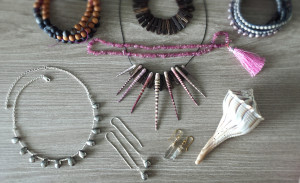
Lyre & Ash
…Every piece is hand made in small batches, which make for some pretty fantastic gifts for any ocean lover.
What I love about this sport, is what it promotes: A clean and healthy lifestyle, and a love for life attitude… even the competitors are down to earth! Everyone that competes or dives for recreation, does it for the love, not the money. Each diver, although sometimes sponsored (which usually just covers gear… if even that) funds their own training, travel and expenses to compete. They are some of the last of the true athletes in the world.
May we all “learn to breath…. so we don’t have to.”
-Nathan Lucas
Author, Co founder of Apnea Addicts, and FII freediving Instructor based in Southern California

